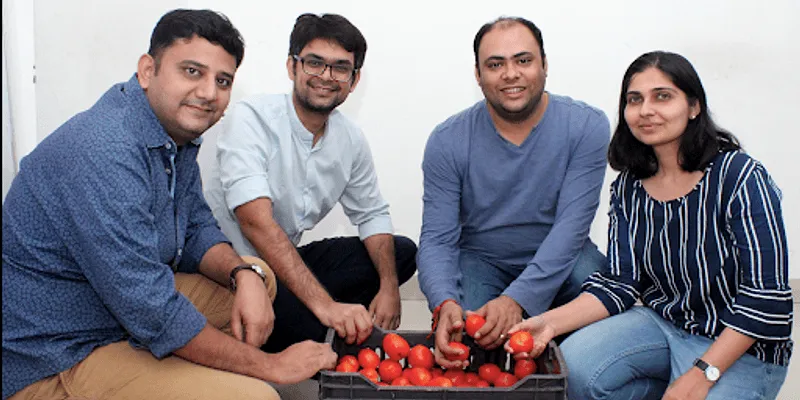
JioGenNext
View Brand PublisherHow a pilot with Reliance Fresh helped Intello Labs disrupt the fresh food supply chain market in India and beyond
Major Indian retailers are today leveraging Intello Track to digitise the quality assessment in their fresh food supply chains. “ If we had to trace IntelloLab’s journey and what helped it win major food retailers, it would definitely be the engagement with Reliance Fresh,” says Milan Sharma, CEO
Started by Milan Sharma, Nishant Mishra, Himani Shah and Devendra Chandani, the Gurugram-based agritech startup, , has come a long way since its inception in 2016. With a predominant presence in India, Intello Labs is beginning to expand its footprint in US, Thailand, China and other markets -- a feat that cannot be matched by most startups in the sector.

Convenience and relevance: two key USPs
At the crux of its growth story is the startup’s flagship product, Intello Track: an image-based artificial intelligence (AI) platform that brings transparency and standardisation to the quality assessment of fruits and vegetables. The algorithm uses AI and computer vision to give a complete update on whether a fruit or vegetable is under-ripe, ready to consume or damaged, with the added capability of carrying out the quality assessment by analysing images of fruits or vegetables grouped together. Images of food items, either taken from a smartphone or a camera, are processed by Intello Lab’s cloud-based AI to generate almost-instantaneous quality reports and calls-to-action.
“This convenience of use is definitely a key USP. But what really makes Intello Track popular is its relevance to every player who is part of the supply chain - food processors, warehouses, retailers, and food companies. Even today, the food supply chain to a large extent is still manual and subjective. Intello Track helps to digitise the process with minimal effort. And with this, we are also able to reduce value risk and wastage in the agriculture supply chains and ensure the best quality reaches the consumers,” says Milan.
The platform has the capabilities to assess about 40 commodities and that list is increasing exponentially, adds the CEO.
Major Indian retailers are today leveraging Intello Track to digitise the quality assessment in their fresh food supply chains to enhance the efficiency of quality management.
“We are also involved in a number of POCs with many of the top retailers. If we had to trace IntelloLab’s journey and what helped it win major food retailers, it would definitely be the engagement with Reliance Fresh.”
Why a pilot was a defining milestone in the startup’s journey
In 2017, Intello Labs got into the JioGenNext accelerator. Among the many key attractions of the programme is the accelerator’s promise to assist the entrepreneurs understand the Jio and Reliance ecosystem, fine-tune the startups’ business plans for making it pitch ready for the management and fast-tracking discussions by connecting them with the right stakeholders. In Intello Labs’ case, it was the connection with the Reliance Retail CFO.
“The JioGenNext team was instrumental in getting us connected to Ashwin Khasgiwala, CFO, Reliance Retail. Back then, the product was a simplified version of the current app. Even then Ashwin Khasgiwala encouraged us to pilot the solution,” says Himani Shah, the CFO of Intello Labs.
The pilot went live at Reliance Fresh’s Central Procurement Centre (CPC) in Mumbai and was designed to monitor the quality of raw produce that was arriving at the CPC. By the end of the four-month pilot, the potential and impact of Intello Labs was clearly established. Not only did it enhance the efficiency of the quality assessment in the supply chain, brought down the decision-making turnaround time for the quality supervisors, but also ensured that better quality fruits and vegetables reached the stores.
“Contrary to the manual process of selecting and sorting, all that the quality supervisors now had to do was click pictures of the fruits or vegetables from the crates that arrived from the vendor and upload that picture on Intello Track. The platform would then give instant quality metrics and its result, making the decision-making process simple and verifiable for the supervisors as well as the retailer. All this helped to bring down the decision-making turnaround time from 20 minutes to 2 minutes,” explains Himani.
What began as a pilot engagement with Reliance Fresh, has today evolved into a large scale deployment. Intello Track is being deployed across 50 Reliance Fresh locations in India which, aside from the metros, also includes cities like Hubli, Surat, Ranchi, Bhubaneshwar, Jalandhar and Kottayam. .
From a technology solution to a product
The pilot was not just instrumental in enabling Intello Labs win its first food retail client, but also helped to fine tune its technology solution into a product that would make sense for the business.
“When we began the pilot, Intello Track was not focused on fresh produce like vegetables and fruits but also food items like grains and spices. But, during the course of the pilot as well as with the many discussions had with the Reliance leadership, we realised there was a need to focus on one aspect and we decided that we would narrow ourselves down from agro produce to only fresh produce,” shares Himani.
This renewed focus helped the startup add more features and use cases for Intello Track. For instance, in addition to monitoring the quality of produce at the CPCs, Intello Track is also being used by the Operations Associates at the retail stores. This ensures that the stores meet the service-level agreements (SLAs) while also providing a consistent customer experience. “In retail, customers inherently pick up the good ones. So stores need to refresh the stock constantly. And, of course, Intello Track makes that job easy for the store Operations Associates.”
The team also added a feature where the vendor id and truck details could be linked to the quality metrics, thereby enabling retailers to track which vendor was faltering with the quality or which vendor has been consistently providing good quality produce. And, with the quality being tracked at the CPCs and stores, retailers today are also able to figure out how transit is impacting the quality of the produce.
The numerous pilots and engagements have also helped the startup unearth the need for a new product - Intello Pack, for premium packaged fruits and vegetables. The platform helps in packaging fresh fruits and vegetables and tracks the quality of these during transit and in-store on shelves.
The JioGenNext accelerator programme has been a strong catalyst for Intello Labs for many reasons. In addition to helping the startup find its feet in the food retail enterprise market, accelerating product development also helped Intello Labs gain investor confidence.
“We have raised $2.7 million in a total of which Nexus Venture Partners and Omnivore have alone invested $2 million,” adds Himani.
Ripe for growth
From spending the first two years in experimenting with applications around computer vision and deep learning, to accidentally bumping into agriculture, realising its massive potential and finding the business validity to serve the space, the journey for Intello Labs has been nothing short of exciting.
“Agriculture industry employs 50 percent of India’s population but contributes only 18 percent of the GDP. So, you can imagine the need for technology to disrupt this area. What’s interesting is the fact that every fifth agritech company is from India, even though the sector is still evolving,” says Milan.
Even though the startups are solving a wide range of problems, from helping farmers grow healthier crops to increasing efficiency in the supply chain, the sector hasn’t seen big success stories as compared to e-commerce, fintech or healthtech. Milan roots this to the numerous challenges that startups face.
“Customer inertia, lack of clarity on government regulation and support are major roadblocks. But as a startup, one of the biggest challenges is attracting talent at the right price points. Thankfully, the interest in this space is going up, so it should get easier going forth. We are thrilled about NASSCOM’s prediction that in the next three years, India will have its first Agritech unicorn.”
As the startup continues to work towards bringing complete transparency in the fresh food supply chains, the 135-member strong team has some big plans for the next few months. “The product has vast opportunities and we would like to grab each one of them,” says Milan. With a keen focus on breaking even, the startup is actively working on its global expansion plan with a focus on the USA and SEA region , followed by markets like Europe, Africa and South America.



![[Funding alert] Gurugram-based Intello Labs raises $5.9M in Series A round from Saama Capital, others](https://images.yourstory.com/cs/2/730b50702d6c11e9aa979329348d4c3e/IntelloLabs-1589374952732.png?fm=png&auto=format&h=100&w=100&crop=entropy&fit=crop)




